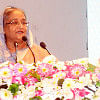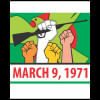Now a part of world heritage

People of Bangladesh know very well the intrinsic value of the historic speech delivered by Bangabandhu Sheikh Mujib on March 7, 1971. A country of the South and its leadership in the struggle for national emancipation has too often been presented through the prism of the North, the power base of most things on earth. To create a proper perspective of history and recognise the common heritage of mankind is a long and persistent struggle. As part of this effort, UNESCO has introduced a few programmes such as World Heritage Site, Intangible Heritage of Mankind, etc. The Memory of the World (MOW) International Register is a comparatively new programme initiated in 1992 with the aim of increasing global awareness about the existence and significance of documentary heritage. MOW International Register is regarded as one of the most prestigious forms of recognition for documentary heritage with outstanding value and global significance, as stated by UNESCO in one of its publications.
I had the opportunity to be associated with the process of nomination when I was invited to join a training workshop in the Asia-Pacific region organised in 2013. The organisers had sent the MOW nomination form to be filled in and brought to the workshop to be discussed. On behalf of the Liberation War Museum, as a custodian of many historical relics, including documents and artefacts related to the March 7 speech, we prepared the submission for inclusion of the great speech as a MOW. Unfortunately, the workshop was not held as planned and the draft found no use.
In 2016 the Bangladesh Ambassador to France, Shahidul Islam, picked up the idea to submit the nomination for March 7 speech as MOW. Through the concerned ministry, he came to know about our previous preparation and contacted me to get that file. Subsequently, a proposal was submitted to UNESCO on April 2016 with co-sponsorship of the Government of Bangladesh represented by Ambassador Shahidul Islam and Liberation War Museum represented by me as a trustee. After going through a long process of scrutiny, the International Advisory Committee and UNESCO approved the List of 2017 MOW with Bangabandhu's March 7 speech getting the recognition it deserved.
Here it is important to dwell on the substance of the proposal where the pertinent issue was to highlight the global significance of the speech. The nomination form contains many technical questions regarding the description, nature, ownership of the heritage, but special focus has been given on the "world significance" of the heritage with questions like—whether the heritage is unique and irreplaceable, whether it had a great impact over time and within a particular cultural area of the world, whether it had a great influence on the course of history, etc. The other areas of explanation were time, place and people, to analyse the heritage from such a perspective was not a problem because the speech had a great impact in terms of time, place and people, but the core issue was placement of the speech from a broader world outlook. Bangabandhu's speech was delivered at a time of high national tension and complex international scenario. The world was divided by the Cold War, but the general consensus prevailed that the post-World War II state boundaries could not be altered. At the same time, the international community agreed on the right of nations to self-determination. Bangabandhu Sheikh Mujib had to steer the struggle of Bangalis not as a secessionist movement, but for the sake of upholding the inherent right of people to self-determination. Highlighting this significance, the proposal stated:
"The speech has great world significance for its contexts and contents, as well as its far-reaching impact on the key assumptions on which the post-World War II international system was built. One of the assumptions was that the international borders redrawn after the WW II were sacrosanct. Even the most arbitrarily and hastily drawn national boundaries of post-colonial states were considered not to be put into question. The March 7 speech constituted a compelling case of how the failure of post-colonial nation states to develop inclusive, democratic society could alienate their populations belonging to different ethnic, cultural, linguistic or religious groups and lead to the dismemberment of nation-states. In fact, the speech triggered the first successful war of liberation by means of cessation since the international boundaries had been redrawn after World War II."
The history of the colonial past and the struggle to wipe-out its legacies to create a free and fair world need to be rewritten from an unbiased perspective. Here the significance of the emergence of Bangladesh as a state that unshackled the bonds of a colonial past and established a nation-state based on linguistic-ethnic identity has great importance. Contextually the speech highlighted a national cultural identity which is not chauvinistic, but syncretic in nature, embracing religious diversity. Such intrinsic values have contemporary relevance, which made the speech transcend time and space. In the proposal it was stated, "The struggle to uphold the national right based on cultural-linguistic identity, essentially secular and liberal, will contribute in building a society of tolerance and harmony in today's strife-ridden world."
The time has come to place Bangladesh's struggle in the context of national liberation struggle of the nations of the third world. If we take this perspective, then we can get a deeper understanding of the role Bangladesh played in the march for freedom in a post-colonial world and the leadership given by Bangabandhu. The inclusion of the March 7 speech as MOW has drawn the attention of all to the broader significance of this struggle. Sheikh Mujib, delivering such a speech, deserves a rightful place among the leading figures of national liberation struggles all over the world, and it is our duty to do the historical analysis and research to put post-colonial history into proper perspective and be the proud possessor of a Memory of the World in its truest sense. That calls for a struggle of emancipation of history and recognition of the leadership of the wretched of the earth. Bangabandhu, through his call for freedom, will be with us in the struggle that lies ahead.
Mofidul Hoque is a cultural activist and essayist. He is the founder trustee of the Liberation War Museum.









Comments